
Say goodbye to calls from unknown numbers. Facebook’s newest app Hello instantly matches phone numbers of incoming and outgoing calls to Facebook profiles to show you info about who you’re talking to, block calls from commonly blocked numbers, and search for businesses to call. Today, Hello is rolling out for public testing in the US, Brazil, and Nigeria, but the catch is that it’s Android-only since iOS won’t let apps interact with phone calls.
Hello’s caller ID feature could clue you in to whether you want to pick up a call from a number you don’t have saved by showing their name and profile picture — as long as they haven’t changed the default privacy setting that lets people search from using their phone number. You’ll then see whatever info they share publicly or with you, like city, employer, website, and more.
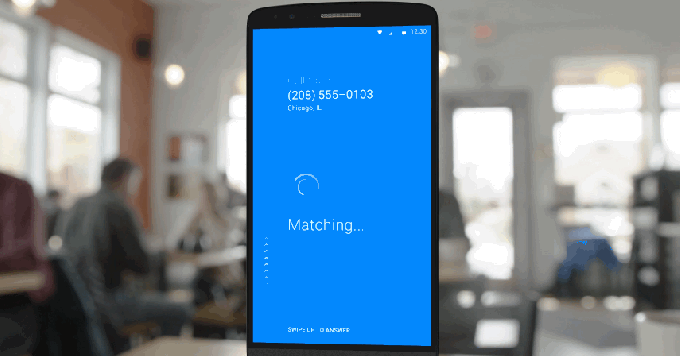
Technically, nothing is changing about Facebook privacy, though it does make personal info more readily visible. Hello essentially just runs an immediate Facebook graph search on any number you call or that calls you.
Hello works and looks quite similar to caller ID app TrueCaller. Last month, Android Police spotted Facebook experimenting with an employees-only version off Hello codenamed “Phone”.
Facebook’s now officially testing the app publicly, as Hello Product Manager Andrea Vaccari says there’s a big problem to solve. “More than 1 billion phone calls are made in the US ever day” he tells me. But “the experience of the phone call hasn’t evolved in a long time.”
Here’s a short video from Facebook showing Hello in action:
Hello World
Hello was built over the last year by a lean team connected to Facebook Messenger, and led by Vaccari. He came to Facebook with the acquisition of his social location startup Glancee, and was the lead on one of the company’s smartest recent product launches, Nearby Friends. “This started as a small group of people
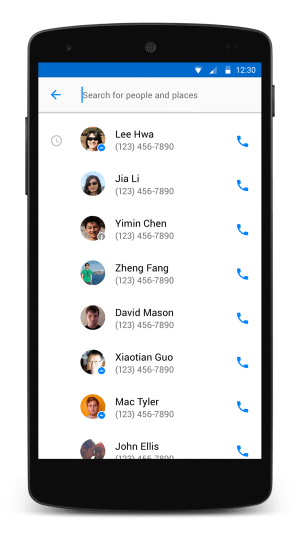
This started as a small group of people passionate about this opportunity. A few months ago we showed it to Mark [Zuckerberg] and he really liked it, and he gave us support to build it. David [Marcus] and the Messenger team were also very supportive.” The app will continue development as part of Facebook’s Creative Labs initiative for building standalone apps.
Vaccari lays out a few big ways that phone calling is broken today. “If you get a call from a number you don’t know, you probably don’t answer it” he tells me. But it could be someone you want to talk to. Hello could solve this by giving you the context needed to intelligently decide whether this is someone you want to talk to or not. In that sense, Hello shares some DNA with Google’s contextual computing system Google Now.
Vaccari also laments that “Anyone with your number can ring you day or night and interrupt you”. While other forms of communication often require our consent, a telemarketer can buy your number and call you incessantly without permission. Hello’s blocking feature could return control to a number’s owner.
“Calling is really big. It’s core to how people connect with each other, including family and close friends, but also businesses and colleagues” Vaccari exclaims.
The New Facebook Phone
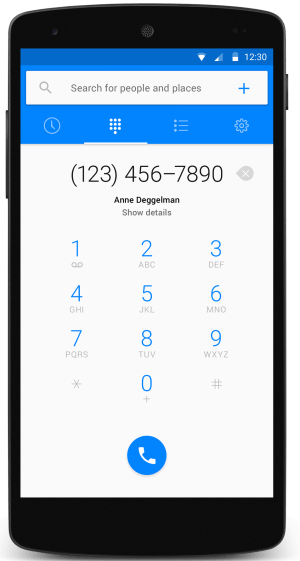
Starting today, access to test the Hello app will start rolling out to Android users in the US, Brazil, and Nigeria. If the test goes well, more countries will be added in the coming weeks.
Once downloaded, you sign in with Facebook, and give it permissions to sync your contacts with Facebook and interact with calls. After that, you can decide whether you want to actively use Hello, or let it just passively surface information about incoming calls.
Here are Hello’s features:
Synced Phone Book
With permission, Hello will add profile pictures and other info to the contacts in your address book. It can also serve as an enhanced version of your phone book, with extra info about friends and others shown inline as you scroll through contacts.
Caller ID
When a Hello user receives a call, Facebook will reference the phone number against its database. If the caller has left their “Who can look you up using the phone number you provided?” privacy setting to the default of “Everyone” or a more private category like “Friends Of Friends” that you’re part of, it will show their name and profile picture.
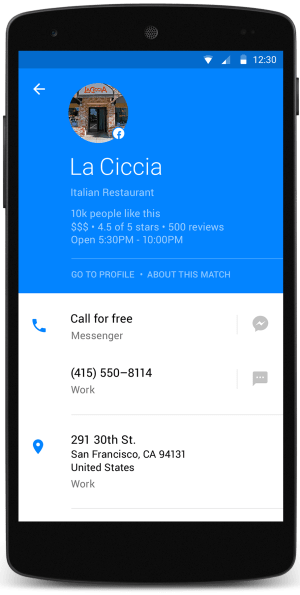
If they share other bio info with you, including current city, home town, employer, job title, education, website, or it’s their birthday today, you’ll see that too. All the information appears in a card overlaid on your screen while the phone is ringing, and you can swipe it away.
If you use Hello as an address book or dialer app, you’ll also get info about people you’re calling. When you punch in a number or call one of your contacts, you could get a heads up about who they are, or if they have a new job or moved to a new city.
Free VOIP Calls
If you hang up on someone or end a call, you’ll see another card of info about them which shows if that caller has Facebook Messenger installed. From there, you can make a one-tap Voice Over IP call to them for free. This feature could be especially useful in developing nations where phone calls can be expensive. If someone calls you, you could just ignore the standard call, then VOIP call them right back at no charge. Combined with Hello’s Caller ID, this could let people avoid paying to be bothered.
Business Search
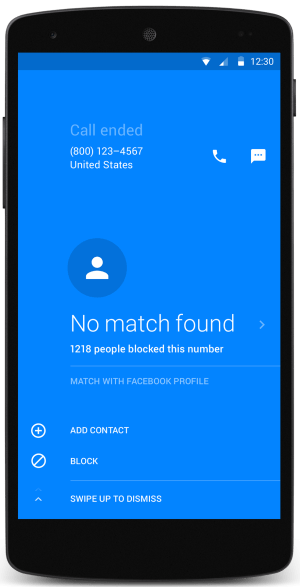
Hello features a smart search bar at the top of its screen. From there you can easily search for your Facebook friends and contacts, but also anyone else, or businesses too. Facebook imports information like phone number, address, and open hours into the info card about businesses, and lets you call them with a single tap. Hello could pick away at some use cases of Yelp and Google in this way, since you can also just search “Pizza” to get the numbers of pizza places.
Call Blocking
Hello can tell you if an incoming call comes from a commonly blocked number. And if enough people have blocked it, Hello can prevent your phone from ringing or vibrating and just automatically send the call straight to voicemail to save your sanity. This and many other settings can be tweaked inside Hello.
Opt Out
In general, I don’t find the Hello privacy defaults to be problematic, but there isn’t a simple way to just opt out of having your info appear in the app.
The best method is to go to your Who Can Find Me settings on Facebook, and narrow the group of people “Who can look you up using the phone number you provided”. This way your basic info won’t appear to strangers you call. You can then go to your About section and reduce the visibility of who can see your phone number, so Facebook can’t match it to friends you call either.

To stay private without cutting off Hello entirely, consider switching who can you find you by phone number to Friends Of Friends, and limiting the extra bio info you share publicly. This way only friends of friends will be able to see who you are when you call, and they’ll only get your name, and profile picture.
One thing Hello doesn’t do is offer crowdsourced caller ID. Just because a bunch of other Hello users have someone listed under the same name doesn’t mean you’ll see that name if they call you. They have to make that info available to you via Facebook.
This is why I think Vaccari has become one of Facebook’s best product people. Nearby Friends could have constantly broadcasted your location, but Vaccari wouldn’t let it because it would have been creepy. Same for crowdsourced caller ID. After years of privacy stumbles, Facebook needs leaders like Vaccari that can combine respect for the user with smart design to make products that are both useful and safe.
Hello$ ?
Vaccari says Facebook isn’t working on trying to monetize Hello right now. Still, there are plenty of opportunities.
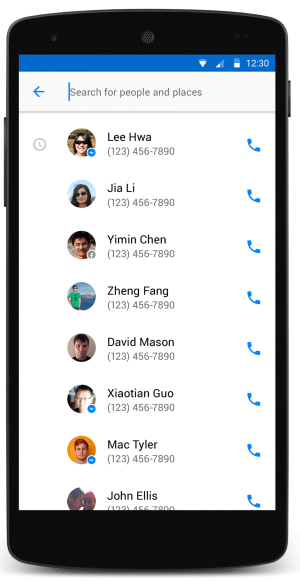
Directly, the business search feature opens the opportunity for Facebook to sell search result ads. Imagine searching for “Pizza” in Hello, and seeing an ad for a local pizza joint next to the listings for an Italian restaurant you Like on Facebook and a pizza place you have saved in your phone. Facebook temporarily tried something similar withsearch result ads for games and Pages in 2012.
Hello could also potentially work with Facebook’s upcoming business instant messaging feature, which will let youMessenger chat with ecommerce retailersyou’ve just bought something from to make changes or get customer support.
But at the very least, Hello could strengthen platform lock-in with Facebook as a whole. That’s how the company looks to benefit from many of its new products. As long as they make you use Facebook more, you’ll see its News Feed ads, which earned it $3.59 billion in Q4 2014.
Hello could boost Messenger texting and VOIP call usage, create links back to Facebook in users’ address books, encourage people to keep their bio info up to date, and serve as a constant reminder of the social network.
Phone Home
Hello isn’t Facebook’s first swing at Android-only software, but the first was certainly a miss. Facebook launched its Android launcher Home two years ago, and watched it promptly flop. The main problem was that it tried to totally redefine how you used your phone, altering your lockscreen, app navigation, chat, and more.
Luckily, Vaccari tells me his team learned from Home’s mistakes. “Hello is more of a targeted experience. Home was more integrated with your phone. Something Hello is doing right is that we’re not trying to reinvent the way you use your phone. Hello is very gentle…it simply adds relevant information when it can.”
“This is caller ID 2.0″ Vaccari concludes.
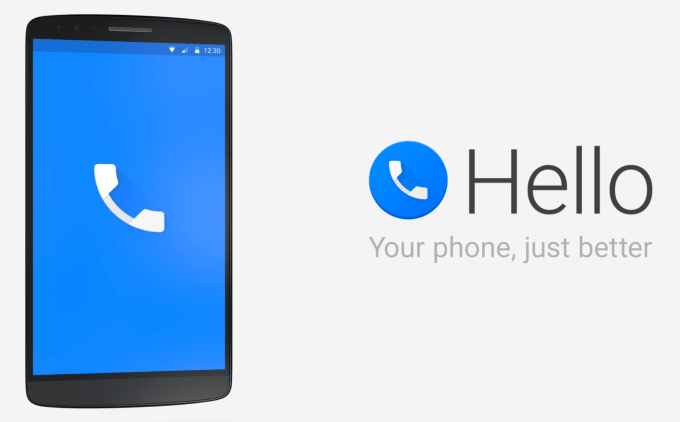

No comments:
Post a Comment